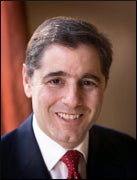 |
| Julius Genachowski Source: Launchbox Digital |
WASHINGTON — Julius Genachowski, President Obama’s nominee to chair the Federal Communications Commission, sailed through a breezy confirmation hearing this afternoon, but several members of a Senate panel emphasized the enormity of the task ahead of him.
The senators gave no indication that he will have any trouble securing a final confirmation, saving their most pointed comments for the way the FCC has been run in recent years.
Grousing most loudly was Commerce Committee Chairman John Rockefeller, who, perhaps indulging in a bit of hyperbole, said he was on the fence as to whether the FCC should even be reauthorized.
“Fix the agency, or we’ll fix it for you,” Rockefeller told Genachowski. “Prove to us that the FCC is not battered beyond repair. Show us that the FCC can put consumers first, and give them confidence that when they interact with the agency they will get a fair response.”
Rockefeller and other members of the panel complained that the FCC has operated in a secretive, closed-off manner, selectively withholding information and kowtowing to industry lobbies.
Genachowski, striking a tone that has broadly defined the talking points of the Obama administration, promised that an FCC under his watch would operate with a “commitment throughout the agency to principles of openness, transparency, fact-based decision making.”
“The FCC can be a model for excellence in government,” he said.
The proceeding was flush with praise for Genachowski’s extensive resume, which includes stints as a top adviser at the FCC, a clerk for three federal judges and a staffer on Capitol Hill.
Introducing the nominee, Sen. Chuck Schumer, the New York Democrat who gave Genachowski his first job out of college, called him a “renaissance man of public service.”
Genachowski is also a long-time friend of President Obama, serving as an adviser and helping draft the technology agenda of his campaign platform.
But he also brings a breadth of industry experience, having served as a senior executive at IAC/Interactive Corp. (NASDAQ: IACI), and founded two D.C.-based venture capital firms, Rock Creek Ventures and LaunchBox Digital.
[cob:Pull_Quote]”If you’re not qualified for this, I don’t know who would be,” said Nebraska Republican Mike Johanns.
As for matters of policy, Genachowski was a soft touch. He deftly avoided specifics, speaking instead in broad terms about things like the paramount importance of ubiquitous broadband access and the need to create a nationwide, interoperable communications network for first responders.
Now that the digital television transition is essentially completed, it is broadband that will take center stage at the commission.
“The growing consensus that we need a national broadband strategy for this country … is a recognition that we as a country are not where we need to be with our communications infrastructure,” Genachowski said.
“Creative use of spectrum”
As chairman, developing that strategy will be one of his biggest jobs — at least in the first six months. The economic stimulus package directed the FCC to report a national broadband plan to Congress by next February, and lend its technical expertise to the agencies doling out the $7.2 billion in grants and loans for broadband projects.Genachowski said he would “pursue and promote competition” in the broadband market without getting too deep into specifics about the policies he might craft to that end.
He did indicate that he will explore the “creative use of spectrum” to facilitate wireless broadband, an area where he sees considerable potential.
“I’m energized by what’s been happening around the country in mobile,” he said. “I believe that we have an opportunity for the U.S. to lead the world in mobile.”
[cob:Special_Report]Spectrum policy is also at the root of the FCC’s past failure to develop the nationwide public safety network for emergency workers that many senators urged swift action on today. The portion of the 700 MHz spectrum set aside for such a network failed to sell at auction last March, and the FCC has yet to decide how to move forward to create an interoperable network that many believe could have saved lives after the Sept. 11 attacks and Hurricane Katrina.
Genachowski also spoke of the need to modernize the FCC’s consumer-facing operation, starting with its Web site, which many have lampooned as a counterintuitive labyrinth of buried information.
“My goal would be to have the FCC’s Web site and its media operation be a model for the rest of the government,” he said. However, he quickly added, “I’ve been around this area long enough that I know I won’t be able to snap my fingers on day one and make it happen.”
Again speaking as a man very much in step with the public image the Obama administration is trying to cultivate, Genachowski said he hoped to “use new media to communicate clearly in plain English to the public.”
The committee dismissed Genachowski with instructions to return written questionnaires to the senators by 6 PM. Next they will put his nomination to a vote at a business meeting, upon which it would pass to the full Senate.
Free Press and Public Knowledge, two prominent advocacy groups that have been among the loudest critics of the FCC in recent years, issued statements today urging a swift confirmation vote for Genachowski, an appointee they see as very much aligned with their agenda.
The committee also considered the nomination of Republican Commissioner Robert McDowell today for a second term in what was seen as a largely pro forma proceeding, as his reconfirmation is all but assured.


